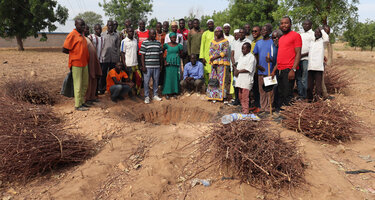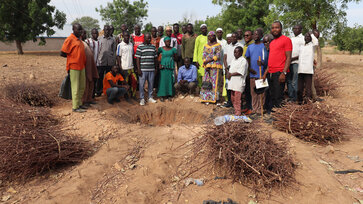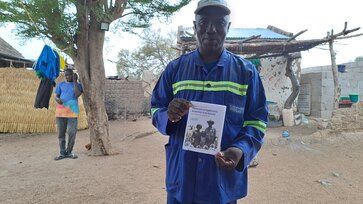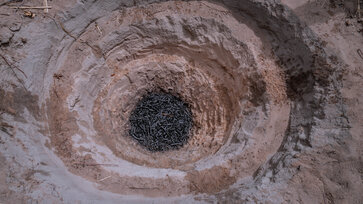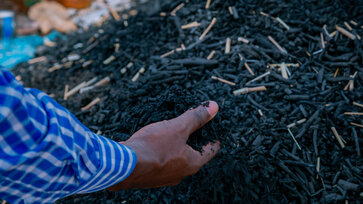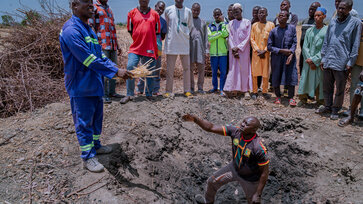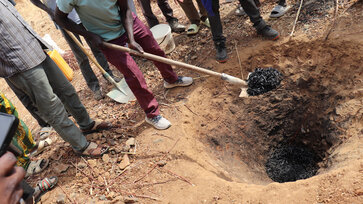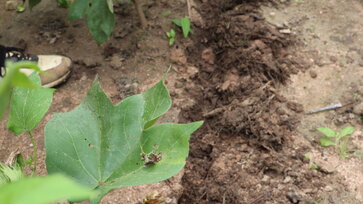What used to be burned now protects against drought and secures income
What used to be simply burned is now becoming a solution: In Cameroon, cotton farmers are utilising their harvest residues in a new way - they are processing cotton stalks into biochar. This approach is at the centre of a project to promote agroecological innovations in cotton cultivation, implemented by the Fund for the Promotion of Innovation in Agriculture (i4Ag) together with other partners. The aim is to strengthen climate-resilient, sustainable and socially just cultivation systems.
Successful introduction of enriched biochar to improve soil fertility and increase yields
Since the start of implementation of the project in 2024, over 220 tonnes of biochar have already been produced and enriched with organic fertilizers such as Bokashi (37.5 tonnes) and Jeevamrit (0.81 tonnes). This combination not only improves soil fertility but also enhances the water retention capacity of the soil – a crucial advantage considering increasing droughts and the generally low organic carbon content in soils.
The project is being implemented together with the International Cotton Advisory Committee (ICAC), the Centre de coopération internationale en Recherche Agronomique pour le Développement (CIRAD), the Cameroonian research institute IRAD and the cotton company SODECOTON - a strong combination of international expertise and local anchorage. In order to bring the new practice to the field, 64 agricultural advisors - including three women - were trained by SODECOTON in the use of enriched biochar. Since then, they have been supporting the farmers with the application on site. The success can already be measured: The average yields on the trial fields have more than doubled compared to the previous year - from 1.356 tonnes/ha (2023) to 2.956 tonnes/ha in the 2024/25 season. While further data on the reliability of this development is pending, the results so far underline the great potential of agroecological innovations.
Intensive knowledge transfer and agroecological innovation
The basis for this success is intensive knowledge transfer: In 2024, 6,968 cotton farmers - including 573 women - were trained as part of Farmer Field Schools. In addition, 1,260 producers received individual coaching and 517 lead farmers were involved in targeted awareness-raising measures to pass on the knowledge to their communities.
“In the cotton-growing zone, there are millions of hectares of degraded land. And when we talk about degraded land, we mean land that is no longer suitable for cultivation. That’s why we welcome biochar – it allows us to easily increase productivity by 20%, 25%, or even 50%.”
Benoit TEIZEM, Head of Agricultural Projects Department, SODECOTON
In addition to the improved utilisation of residues, the project also focuses on other agroecological innovations: Climate-resilient cotton varieties are being tested and neem-based botanical biopesticides are being used. These are encapsulated in nanoparticles of maize protein, which stabilises them against UV radiation and prolongs their effectiveness in the field.
All measures pursue a common goal: the validation, adaptation and dissemination of agroecological solutions that offer smallholder farmers in the cotton sector a sustainable future - especially in the face of increasing desertification and drought. Additional potential is seen in the fact that biochar, produced from cotton stalks, can store up to 3 tonnes of CO2 equivalent in the soil. Smallholder cotton producers could thus generate additional income through the sale of carbon credits.
This project is part of the Sustainable Agricultural Supply Chains Initiative (SASI). The SASI promotes green, fair and inclusive agricultural supply chains. Together with politics, business and civil society, it puts sustainability issues on the agenda and shapes the political discourse. The initiative is implemented by GIZ on behalf of BMZ.
